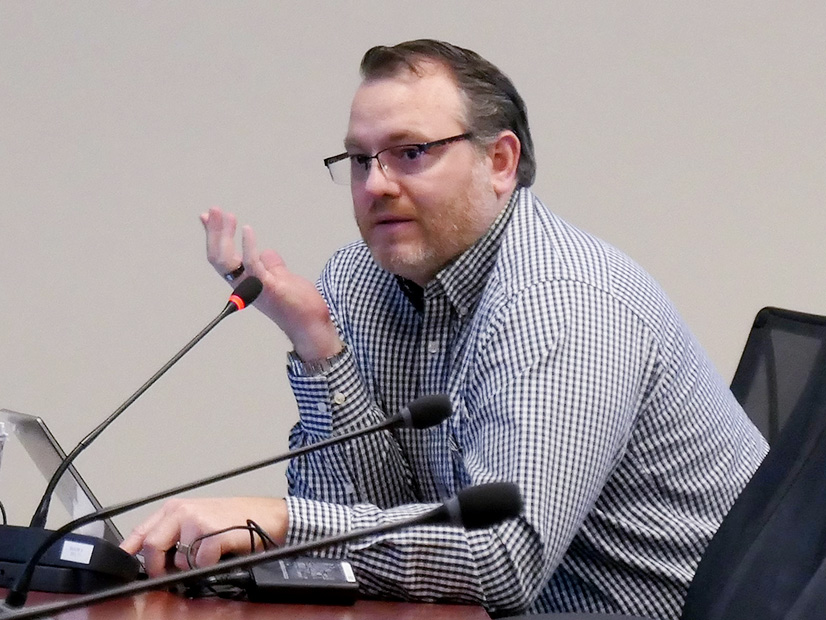CARMEL, Ind. — MISO appears set to limit transmission congestion by instituting a lower system impact threshold on interconnecting generation that is all but certain to prompt more network upgrades.
“We’ve received a lot of feedback on this item,” MISO’s Kyle Trotter said during a Planning Advisory Committee meeting Wednesday. “We continue to believe that this change will bring positive impacts to stakeholders and future system reliability.”
The RTO’s proposal might dim prospects for some new generator interconnection requests. (See MISO Insists it can Handle Record-setting Interconnection Queue.)
Last summer, MISO suggested halving new generation’s allotted distribution factor’s (DFAX) effect on transmission from 20% to 10% for its basic and unguaranteed energy resource interconnection service (ERIS). (See MISO Recommends Lower Distribution Factor to Address Congestion.)
Trotter said the change will result in upgrade costs being shared among more interconnection customers and fewer unaddressed reliability issues being passed on to later queue cycles or surfacing in MISO’s annual transmission expansion plans. He also said the likely additional upgrades will help reduce “future reliability issues and overloaded equipment.”
The grid operator responded to a request from MISO South members and studied a 5% DFAX limit but decided the threshold would be too drastic. Staff said a 10% limit provides a good balance without being too aggressive.
Some stakeholders have said that it’s premature to lower the DFAX threshold across the board when MISO hasn’t yet put together a long-range transmission plan portfolio for the South region. Staff have marketed the LRTP portfolios as being able to support more generation interconnections.
Generation developers maintain that a tighter DFAX threshold is punitive and places even more responsibility for system planning on interconnection customers. Some stakeholders have argued that MISO is conflating transmission reliability with real-time congestion costs.
“The plan remains the same,” Trotter said, adding that MISO will begin applying the change to the 2022 cycle of projects entering the definitive planning phase. The revision requires a change to MISO’s business practice manuals.
Several stakeholders complained that staff haven’t studied the possible financial impact to interconnection customers.
“This was sold as a way to reduce congestion,” NextEra Energy’s Matt Pawlowski argued. “I as a NextEra representative don’t know what I’m actually getting with this change. No dollars have ever been shown. I know one thing: My costs are going to be higher. But I’m not sure what I’m going to get for that money. I would love to know what the plan is to actually show that.”
Pawlowski said that the issue was introduced as an economic benefit, but MISO morphed it into a reliability matter.
Andy Witmeier, director of resource utilization, agreed that stakeholders initially raised the issue as an economic one. He said when staff examined the situation, it became clear that the RTO needed to act out of a concern for reliability.
“We’re going to be adding three to four times more generation to our grid than is retiring. So, this is just going to continue. Our stance is that now is the time to make this change. We can’t wait for all these units to come online,” Witmeier said. “Certainly, there are economics at play here, but MISO’s position has always been, ‘This comes down to reliability.’”
“The problem is you’ve not proven anything,” Pawlowski said. “We’ve conflated economics with reliability and come up with reliability because it’s the easier one to pursue. And we’re going to pay those extra dollars not knowing … whether we have better access to the grid. That hasn’t been addressed.”
Witmeier countered that MISO’s reliability analyses of a tighter DFAX threshold turned up “a lot of constraints that we’ve been ignoring.”
Union of Concerned Scientists’ Sam Gomberg said MISO has not performed a cost-benefit analysis to show that a lower DFX cutoff would combat congestion.
“We don’t know the impact of this change. All of the projects could withdraw, and none of these upgrades could be built,” Clean Grid Alliance’s Rhonda Peters said. “I’m not saying that’s the case. I’m saying we haven’t done an adequate study.”
Peters said that MISO has not contemplated how much generation might drop out because of a 10% cutoff.
Travis Stewart, representing the Coalition of Midwest Power Producers, said the change means that the grid operator should update upgrade estimates for affected interconnection customers.
Witmeier said that IC customers, who consistently withdraw from the queue, should perform their own benefits analysis. He argued that the footprint doesn’t currently have enough customers to buy all 280 GW of the generation in the queue.
“MISO is responsible for setting the reliability standards on congestion from generator interconnection. We’re doing that,” he said.
Sustainable FERC Project’s Lauren Azar has maintained that lowering the DFAX threshold will result in more costs transferred to generators.
“Interconnection is about reliability and not addressing congestion,” Clean Grid Alliance’s Natalie McIntire argued during an October meeting of MISO’s Interconnection Process Working Group. “What’s resulting is congestion in real-time, which is an economic issue. ERIS generators are energy-only and should expect to be curtailed.”
MISO staff contended at the time that the binding constraints interconnections ultimately cause are a reliability issue. They said potential constraints are currently being ignored in the GI process, only to crop up later in the system.




